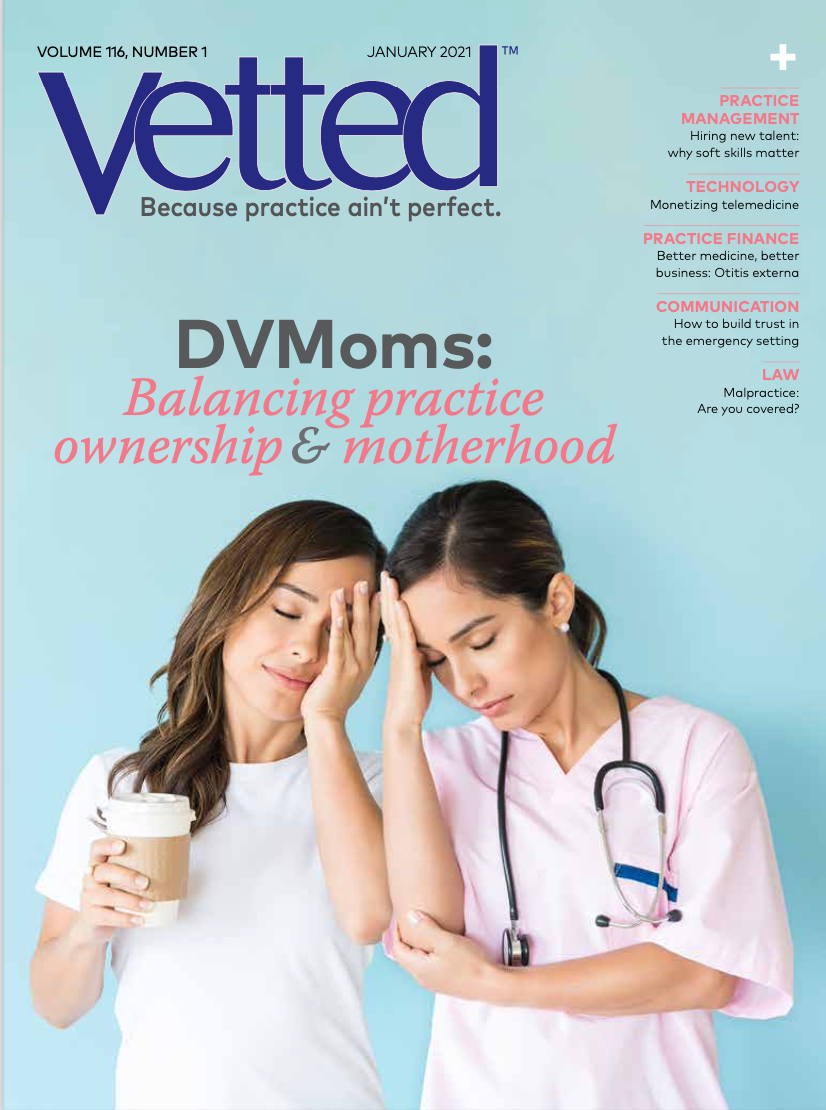As a veterinarian, juggling parenthood and career can be daunting on its own. Add in being a woman and owning a practice, and you might as well sell tickets for a 3-ring circus, right? Maybe not. It turns out that owning a veterinary practice might be the key to striking the ideal work-life balance for these working moms.
After all, moms have the adaptability, patience, and perseverance to thrive in any high-pressure situation. Just ask Kim Bishop, DVM, Jordan Gesimondo, DVM, MPH, and Stephanie Strunk Hickey, DVM. These all-star multitaskers represent the leadership team of DVMoms, a Facebook group with more than 14,000 members that provides “support, empathy, commiseration, and humor between women who are all struggling to find balance and sanity in work, motherhood, and life.”
During the Fetch dvm360® virtual conference, the trio coordinated their hectic schedules to host an honest discussion about balancing motherhood and veterinary practice ownership.
Meet the moms
- Kim Bishop, DVM, is a graduate of Texas A&M University College of Veterinary Medicine, a veterinarian at Courtenay Animal Hospital in Merritt Island, Florida, and mom to a 7-year-old daughter. Bishop is currently on the path to becoming a veterinary practice owner.
- Jordan Gesimondo, DVM, MPH, a graduate of Colorado State University College of Veterinary Medicine & Biomedical Sciences, is part-owner of Beardsly Animal Hospital in Glendale, Arizona. She is also mom to 3 children ranging in age from 6 months to 5 years. Gesimondo’s clinic is a part of AZPetVet, a group of 21 hospitals throughout Arizona.
- Stephanie Strunk Hickey, DVM, is a graduate of the University of Tennessee School of Veterinary Medicine, sole owner of Admiral Veterinary Hospital in Knoxville, Tennessee, and mom to an 8-year-old son. Hickey purchased her practice from its previous owner—and her former boss—upon his retirement.
Everyone must learn to play by the rules
“Simultaneously, the best and hardest part of being a business owner is creating the culture for your practice,” Bishop said. But as a mom, you were built for this. “We are used to being in charge of growing and sculpting the character of our children. It may sound cliché, but a lot of those strategies can be used to your advantage in forging a clinic culture.”
“Being a role model both at work and at home is a lot of work,” Gesimondo admitted. “But we learn what works and what doesn’t, we experiment with various ways to coach and correct.”
Practicing servant leadership is 1 of the pillars of creating a positive clinic culture, Gesimondo said. “Leading with humility can help you gain the respect of your staff and also displays the expectation of teamwork. If I am cleaning out a kennel to help a technician, it shows I truly care and am in the trenches with them.”
Hickey believes staff management can be the single biggest factor in determining how successful and fulfilled you are as a practice owner. “Finding the right staff is hard work and takes time, but it absolutely can be done,” she said. It starts with setting the tone of your practice culture, never wavering from your ideals, and training staff to understand and meet your expectations.
Do not be afraid to hold your staff accountable, Bishop said. “I have done this with my staff in the same way I do with my 7-year-old. You have to make sure the rules are explained and understood. You cannot have a moving target and expect them to abide by rules they don’t fully understand.”
If it becomes apparent that a staff member refuses to play by the rules or does not align with the clinic’s culture, make the decision to let them go. “That is one difference from parenthood,” joked Bishop.
Whining and tantrums…from clients
The adage that “the client is always right” has some important caveats, the doctors agreed. “Clients should definitely be listened to, but they cannot be rude,” Bishop said. In some instances, letting clients know they should find care for their pets elsewhere is for the betterment of your hospital. “It makes your employees feel so much better to know you have their backs,” she added.
Setting boundaries with pet owners from day 1 can help generate the right clientele, Hickey said. Ask yourself: Will you be the kind of owner who drops everything to help a client, even if it means sacrificing time with your family? Or will you set—and stick to—boundaries?
“We can’t be all things to all people,” she explained. “Setting boundaries first and foremost helps build a successful practice and allows clients to know what to expect. You don’t have to be rude, but you do have to be firm.”
“It is a fine balance,” Gesimondo added. Clients under stress due to an expected pet illness or unforeseen expense are akin to toddlers struggling to process emotions they do not yet fully understand. “They are vulnerable and often scared. So, we have to dig deep to find empathy for them and their situations while also setting boundaries and not letting them get away with bad behavior.”
To ensure everyone is playing from the same rulebook, practice owners need to be upfront and consistent about the hospital’s operating hours, what the staff’s skills and abilities are, and the caseload you can reasonably handle. Be honest about the fact that you have a family that requires your attention, too.
“While you don’t have to be too personal, showing clients that you are human can make them respect and appreciate you more,” Hickey said. “And if they don’t, those were not the clients you wanted anyway.”
This is not Monopoly money
The women agreed that one of the most common perceived roadblocks on the journey toward practice ownership is the belief that you will not be able to afford it. “It is definitely possible and can be 1 of the best decisions to set you and your family up for financial stability,” Bishop said.
Hickey echoed that thought. “Owning a practice can allow you to have more time with your children, help alleviate debt, and give you the freedom to take more time off and experience life outside of work,” she said.
Hickey purchased her veterinary hospital using a Small Business Administration loan. “While I do have all of the debt, as a single practice owner I also have all of the profits,” she said. “And since my practice was already established, I was pretty profitable within 6 months of ownership.”
She credits part of her financial success to surrounding herself with the right team. “Hiring an accountant who understands veterinary hospital finances can be ideal in maximizing your profits. Hiring a practice manager can also help you keep track of your financials and allow you to focus on medicine while still growing the business.”
Gesimondo, who has the unique perspective of buying into an established network of practices, was transparent about the pros and cons of this particular avenue of ownership. Currently, she is 1 of 3 on-site owners and initially purchased 4% of the clinic she practices at. “The great thing about being a partner in a group is that you don’t have to buy a whole practice,” she explained.
Mastering the balancing act
“As a practice owner, you work long hours, and a little piece of your mind and heart are always in the clinic whether you are physically there or not. But you also have the freedom to control your schedule and drive your destiny,” Bishop reiterated.
“Even though everything falls to me as the practice owner, it is possible to have a good work-life balance as both a mom and a veterinarian,” Hickey said.
It all comes back to establishing proper boundaries, Gesimondo said. First, decide what is most urgent—think of it like triage for your life. “This is our specialty. We are so good at this!”
Rather than dwelling on what you were not able to get done on any given day, shift your focus to what you were able to accomplish. That list is bound to be much more impressive.
Will the first few months of your new venture be difficult? Absolutely. But that does not mean it won’t be worth it. “Your work-life balance will likely be a bit skewed at the beginning of any ownership journey, but with proper management, you can find the right balance again,” Hickey said. “Cultivating a great team, delegating tasks to individuals, hiring a practice manager, and having boundaries with staff and clients will set you up to be happier at home and work.”
Moms, listen closely
“If you were thinking of taking the ownership leap, I say go for it,” Hickey said. “There are so many resources out there to help you. Being a mom has not slowed down my ability to take care of my practice, and my practice has not hurt my being a mom either.”

